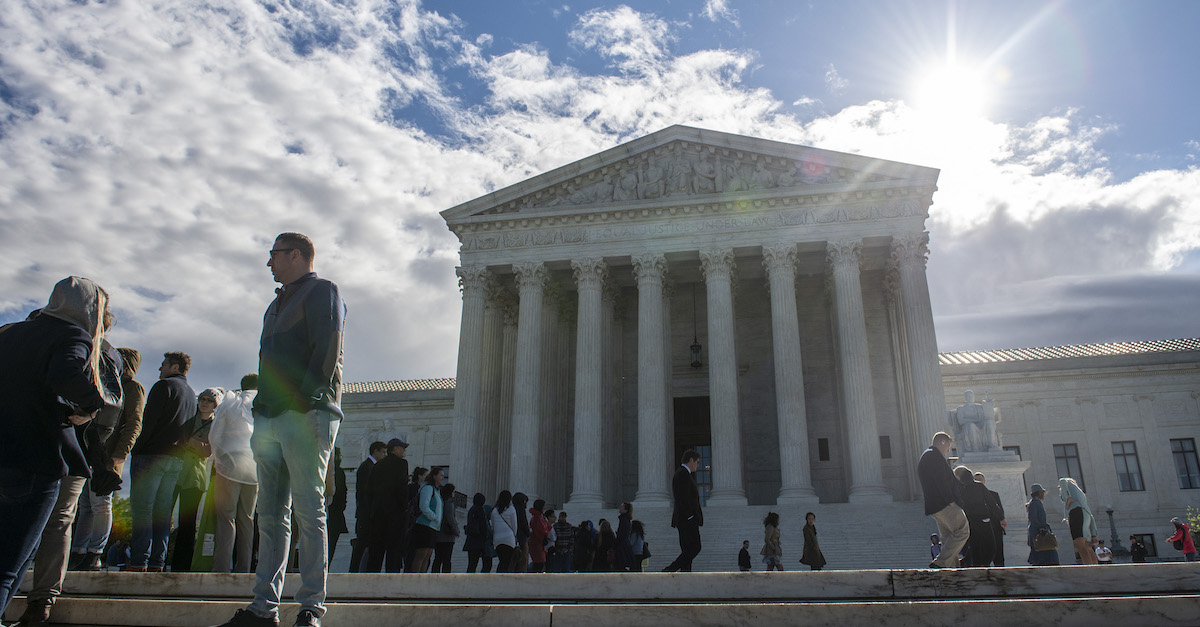
The U.S. Supreme Court’s much anticipated opinion of the ongoing dispute over the 2020 census citizenship question arrived on Thursday. In Dept. of Commerce et al. v. New York, et al., SCOTUS, in a 5-4 decision, decided that the lower court was warranted in blocking the addition of the question.
Here’s how it broke down among the justices (and it says a lot about what unfolded here):
ROBERTS, C. J., delivered the opinion for a unanimous Court with respect to Parts I and II, and the opinion of the Court with respect to Parts III, IV–B, and IV–C, in which THOMAS, ALITO, GORSUCH, and KAVANAUGH, JJ., joined; with respect to Part IV–A, in which THOMAS, GINSBURG, BREYER, SOTOMAYOR, KAGAN, and KAVANAUGH, JJ., joined; and with respect to Part V, in which GINSBURG, BREYER, SOTOMAYOR, and KAGAN, JJ., joined. THOMAS, J., filed an opinion concurring in part and dissenting in part, in which GORSUCH and KAVANAUGH, JJ., joined. BREYER, J., filed an opinion concurring in part and dissenting in part, in which GINSBURG, SOTOMAYOR, and KAGAN, JJ., joined. ALITO, J., filed an opinion concurring in part and dissenting in part.
This is a detailed, complicated opinion, partially vacating and partially upholding a ruling from the N.Y. lawsuit in a much more sprawling litigation, and remanding for agency review, but the headline is just as @mjs_DC stated:
SCOTUS blocked the citizenship question.
— Adam Klasfeld (@KlasfeldReports) June 27, 2019
From the opinion:
Altogether, the evidence tells a story that does not match the [Commerce] Secretary’s explanation for his decision. Unlike a typical case in which an agency may have both stated and unstated reasons for a decision, here the VRA [Voting Rights Act] enforcement rationale—the sole stated reason—seems to have been contrived. The reasoned explanation requirement of administrative law is meant to ensure that agencies offer genuine justifications for important decisions, reasons that can be scrutinized by courts and the interested public. The explanation provided here was more of a distraction. In these unusual circumstances, the District Court was warranted in remanding to the agency.
The court would also say there was a “significant mismatch between the decision the [Commerce] Secretary made and the rationale he provided.”
It was announced in Feb. 2019 that a writ of certiorari was granted in the case. That petition to hear the case was granted before a judgment. What this meant was that the Supreme Court would review the case in advance of a judgment by an appellate court. Instead, it went directly from U.S. District Judge Jesse M. Furman‘s court to SCOTUS.
Previously, Furman ruled that Commerce Secretary Wilbur Ross had to sit for a deposition in the lawsuit over the controversial citizenship question. The question asks people to identify on the census whether they are American citizens or not. Furman said that Ross’s credibility was an issue.
“Applying well-established principles to the unusual facts of these cases, the Court concludes that the question is not a close one: Secretary Ross must sit for a deposition because, among other things, his intent and credibility are directly at issue in these cases,” Furman wrote. Furman had already ruled that plaintiffs plausibly argued the Trump Administration acted with “discriminatory animus” by attempting to include the controversial question on census forms. Furman said that due to the public interest, Secretary Ross would have to sit for a deposition for the sake of transparency.
“Most significant, the Court found reason to believe that Secretary Ross had provided false explanations of his reasons for, and the genesis of, the citizenship question,” Furman said.
In Nov. 2018, the Supreme Court denied the Department of Commerce’s request for a stay in the 2020 census question case. Conservative justices Clarence Thomas, Samuel Alito, and Neil Gorsuch did not agree. In Jan. 2019, Furman blocked the inclusion of the question and called out Wilbur Ross in a lengthy opinion.
The New York Immigration Coalition (NYIC) recently asked the Court to push back its expected ruling due to the discovery of new evidence.
The request to postpone the Court’s ruling stemmed from the discovery in late May of new documents from the estate of recently deceased Republican operative Thomas Hofeller. As Law&Crime previously reported, Hofeller notoriously specialized in gerrymandering maps to ensure Republican advantages. The documents purportedly showed that Hofeller specifically orchestrated the addition of the citizenship census question to achieve similar advantages.
In particular, plaintiffs asked for limited remand to the lower court if the Supreme Court decides not to uphold the lower court decision. After the Hofeller evidence came to light, Judge Furman acknowledged the seriousness of it, while also saying his court lacked jurisdiction.
Separately, challengers of the census filed documents on June 14 in U.S. District Judge George J. Hazel‘s court, writing “These newly discovered documents…eliminate any colorable doubt about the link between Hofeller and government employees involved in the citizenship question approval process.” Judge Hazel agreed on Monday that the Hofeller evidence “potentially connects the dots between a discriminatory purpose–diluting Hispanics’ political power–and Secretary Ross’s decision.”
Hofeller’s name did not come up in today’s opinion.
What’s next? The question is being sent back to Commerce, but there is a time crunch.
https://twitter.com/marceelias/status/1144256627203301377
Two bottom lines on the #Census case: The administration most likely doesn’t have enough time left to revive its plan. And if they hadn’t acted in so flagrant a manner, #Scotus probably would have given them the OK. But Wilbur Ross was a bridge too far for the Chief Justice.
— David Lauter (@DavidLauter) June 27, 2019
In a nutshell, the Court did not decisively reject the inclusion of a citizenship question, but today’s decision is going to make it _very_ difficult, both legally and logistically, for the government to ultimately ask the question on the #2020Census.
— Steve Vladeck (@steve_vladeck) June 27, 2019
[Image via Eric Baradat/AFP/Getty Images]